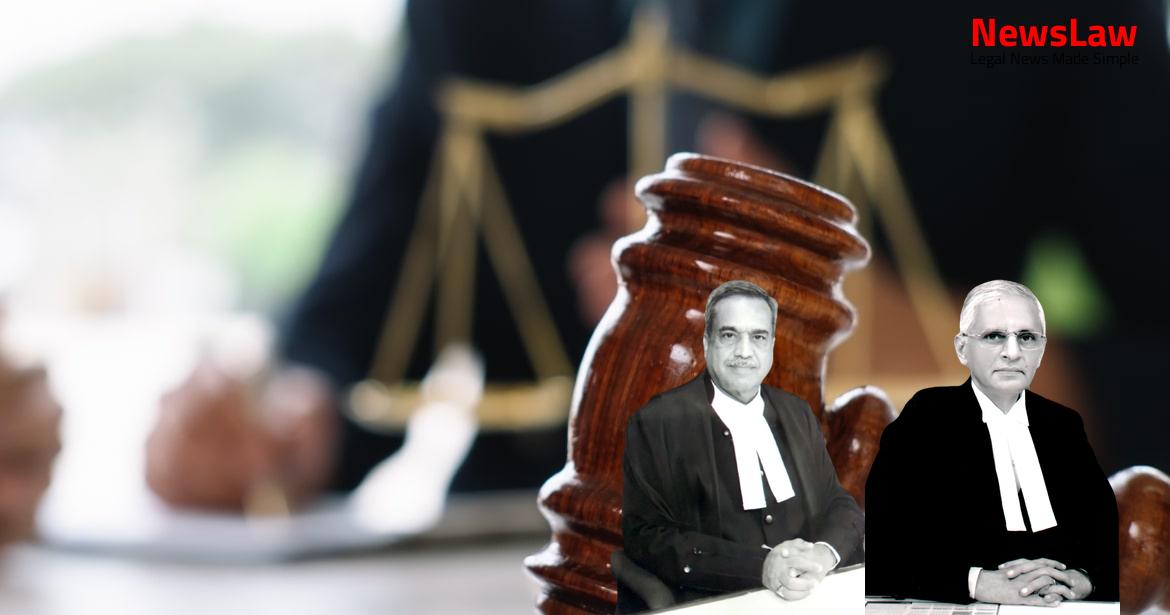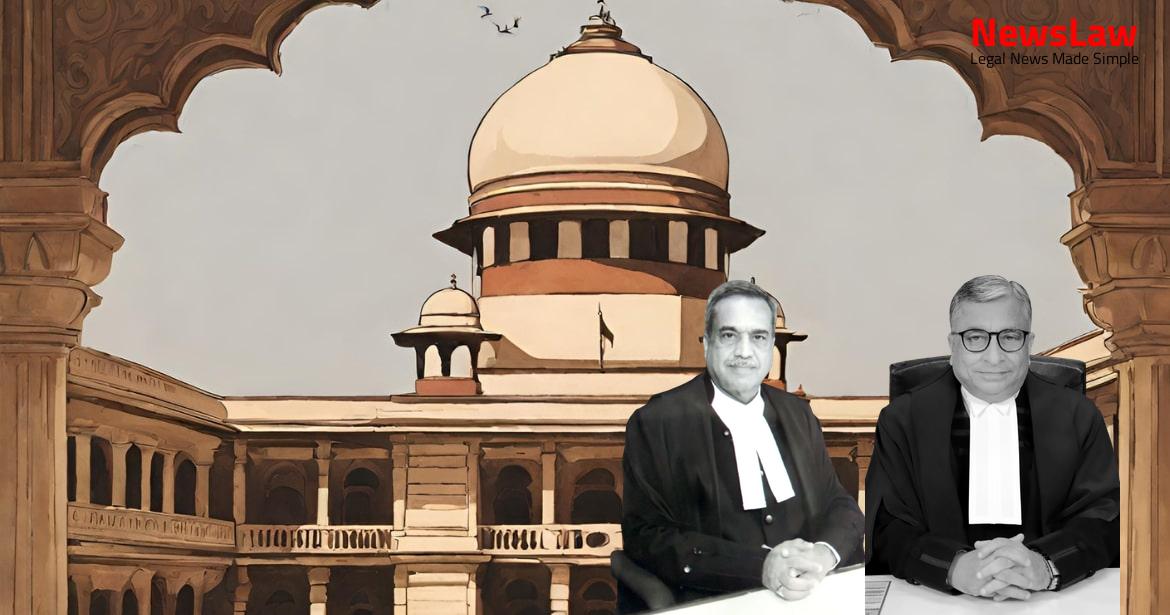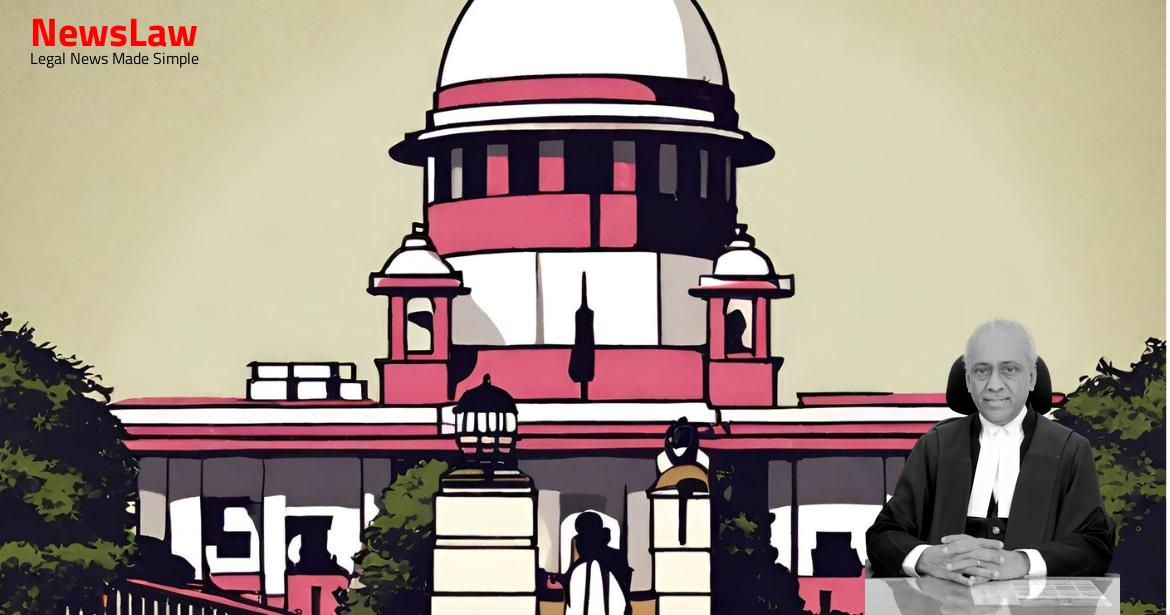Delve into the detailed legal analysis by the court regarding presumptions under the Negotiable Instruments Act. Discover insights on signature admissions, burden of proof, and the application of legal principles in a recent case. Follow along for a comprehensive understanding of how the court approached the complexities of the law in this matter.
Facts
- The respondent issued a cheque dated 17.05.1998 for Rs. 1,50,000 towards the advance amount paid, but the cheque was dishonoured.
- The appellant learned that the property was in the name of the respondent’s father and the respondent was not the absolute owner.
- An agreement dated 06.06.1996 for Rs. 3,50,000 as advance amount was executed by the respondent, but the house stood in the name of the father of the respondent.
- The appellant demanded the return of Rs. 3,50,000 paid as advance amount, and the respondent issued a cheque for Rs. 1,50,000 which was dishonoured due to ‘insufficient funds’.
- The appellant filed a complaint under Section 138 of the Negotiable Instruments Act, which led to the conviction of the respondent by the JMFC.
- The conviction order was set aside by the learned Single Judge, and the Revision Petitions filed by the appellant were dismissed.
- The appellant and the respondent were known to each other for about 7-8 years prior to the transaction in question.
- The respondent explained financial difficulties and offered to sell a property in Sirsi to the appellant for Rs. 4,00,000, out of which Rs. 3,50,000 was paid as advance.
- The JMFC raised presumption under Section 118 and 139 of the N.I. Act as the signature on the agreement and cheque were admitted and not rebutted by the respondent.
- The appellant sought prosecution of the respondent under Section 138 of the N.I. Act, leading to the conviction of the respondent.
- The respondent appealed the judgment of the JMFC.
- The appellant also filed an appeal seeking enhancement of the sentence.
- Both appeals were dismissed by the learned Sessions Judge in separate judgments.
Also Read: Supreme Court Upholds Rejection of Plaint Under Order VII Rule 11 of CPC: A Critical Analysis
Arguments
- Accused’s signature on the cheque is admitted
- Presumption under Section 118 of the Act inferred that the cheque was made for consideration
- Accused failed to prove payment of the stated amount to the respondent
- Burden to rebut the presumption was on the accused
- Court did not rely on interested testimony to rebut the presumption
- Accused cannot now argue differently on this aspect
- Presumption remains until the contrary is proved
- Reference to Basalingappa vs. Mudibasappa case regarding documents and payment transaction
- Acknowledgment that signature on documents is not disputed
- Contention raised by the respondent during the Revision Petition regarding payment circumstances
- Presumptions regarding negotiable instruments until the contrary is proved
- Reference to K. Bhaskaran vs. Sankaran Vaidhyan Balan & Anr. case for presumptions
- Mr. G.V. Chandrasekar argued that the trial and appellate courts did not properly assess the case.
- The courts hastily raised a presumption based solely on the admission of the signature on the cheque.
- In the Basalingappa vs Mudibasappa case, the ultimate conclusion was against raising a presumption due to different facts and circumstances.
- The transaction details and the lack of evidence of funds in the appellant’s possession were crucial factors.
- The High Court examined the circumstances of how the cheque was signed and rightfully set aside the conviction.
Also Read: Validity of Debt and Enforcement of Section 138 NI Act
Analysis
- The legal position under Section 118 and 139 of N.I. Act on signature admission reiterated.
- Accused does not need to testify in court to support their defense.
- The Trial Court should be the foundation for examining contentions.
- Evidence on record presents a probable defense, shifting the burden to the complainant.
- Presumption under Section 139 is rebuttable, with the onus on the accused to present a probable defense.
- Accused’s cousin being an advocate does not imply admission of a dominant position.
- Accused failed to raise a probable defense, hence the presumption under Section 139 remains.
- Signature on cheque not disputed, thus presumption in favor of the appellant remains.
- Examination of agreement discrepancies and property details by Single Judge deemed irrelevant.
- No necessity for the accused to take the stand in support of defense.
- Presumption under Section 139 remains unrebutted due to lack of evidence from the respondent.
- Relative’s connection to appellant’s advocate not sufficient to rebut the presumption.
- Standard of proof for rebutting presumption is preponderance of probabilities.
- Complainant’s financial capacity needed to be proven; payments made by complainant highlighted.
- The appellant’s payments and nature of contentions did not rebut the presumption in this case.
- Once the execution of the cheque is admitted, Section 139 of the Act mandates a presumption that the cheque was for the discharge of any debt or other liability.
- The presumption for passing of consideration arises as provided under Section 118(a) of the N.I. Act.
- Section 139 of the Act presumes in favor of the holder that the cheque was received for the discharge of any debt or liability, unless proven otherwise.
- The decision in K. Chinnaswamy Reddy vs. State of Andhra Pradesh and Anr. AIR 1962 SC 1788 is not applicable in the present situation.
- The learned counsel for the respondent attempted to rely on this decision, but it is not relevant to the facts of the current case.
- Enhanced fine is deemed appropriate in this case based on the facts and circumstances
- The imposition of an enhanced fine would serve the interests of justice
- The period in question is likely to involve significant social and economic changes for the parties involved
- Gravity of complaint under N.I. Act is not equivalent to an offence under the Indian Penal Code or other criminal offences
Also Read: Enlargement on Bail in Illegal Mining Case
Decision
- Appeals No. 849-850/2011 partially allowed.
- Sentence of six months simple imprisonment and Rs. 2,00,000 fine modified.
- Rs. 2,40,000 to be paid to the Appellant/Complainant as compensation.
- Conviction in C.C. No.790/2000 restored.
- Fine of Rs. 2,50,000 to be paid by the Respondent/Accused within three months.
- High Court’s order in Criminal Revision Petition No. 1282/2006 and 1481/2006 set aside.
- In default of fine payment, Respondent/Accused to undergo six months simple imprisonment.
- Penalty of imprisonment if default in fine payment after not taking benefit of alternative.
Case Title: TRIYAMBAK S.HEGDE Vs. SRIPAD (2021 INSC 529)
Case Number: Crl.A. No.-000849-000850 / 2011



